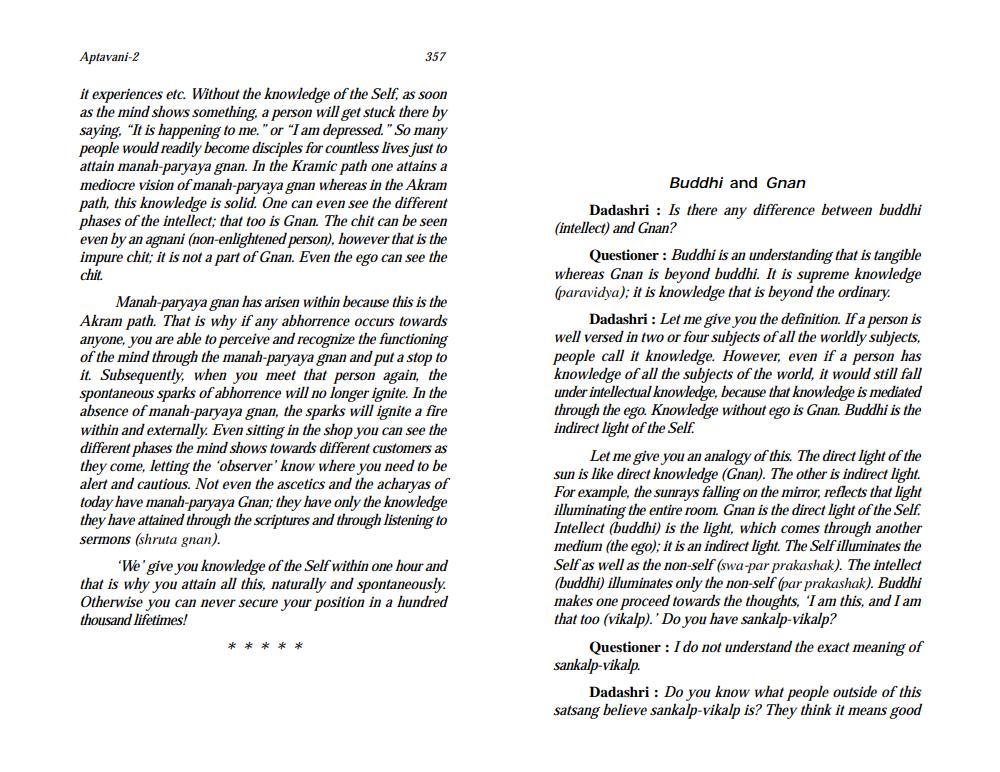________________
Aptavani-2
357
it experiences etc. Without the knowledge of the Self, as soon as the mind shows something, a person will get stuck there by saying, "It is happening to me." or "I am depressed." So many people would readily become disciples for countless lives just to attain manah-paryaya gnan. In the Kramic path one attains a mediocre vision of manah-paryaya gnan whereas in the Akram path, this knowledge is solid. One can even see the different phases of the intellect; that too is Gnan. The chit can be seen even by an agnani (non-enlightened person), however that is the impure chit: it is not a part of Gnan. Even the ego can see the chit.
Manah-paryaya gnan has arisen within because this is the Akram path. That is why if any abhorrence occurs towards anyone, you are able to perceive and recognize the functioning of the mind through the manah-paryaya gnan and put a stop to it. Subsequently, when you meet that person again, the spontaneous sparks of abhorrence will no longer ignite. In the absence of manah-paryaya gnan, the sparks will ignite a fire within and externally. Even sitting in the shop you can see the different phases the mind shows towards different customers as they come, letting the observer' know where you need to be alert and cautious. Not even the ascetics and the acharyas of today have manah-paryaya Gnan; they have only the knowledge they have attained through the scriptures and through listening to sermons (shruta gnan).
'We give you knowledge of the Self within one hour and that is why you attain all this, naturally and spontaneously. Otherwise you can never secure your position in a hundred thousand lifetimes!
Buddhi and Gnan Dadashri : Is there any difference between buddhi (intellect) and Gnan?
Questioner : Buddhi is an understanding that is tangible whereas Gnan is beyond buddhi. It is supreme knowledge (paravidya); it is knowledge that is beyond the ordinary
Dadashri : Let me give you the definition. If a person is well versed in two or four subjects of all the worldly subjects, people call it knowledge. However, even if a person has knowledge of all the subjects of the world, it would still fall under intellectual knowledge, because that knowledge is mediated through the ego. Knowledge without ego is Gnan. Buddhi is the indirect light of the Self.
Let me give you an analogy of this. The direct light of the sun is like direct knowledge (Gnan). The other is indirect light. For example, the sunrays falling on the mirror, reflects that light illuminating the entire room. Gnan is the direct light of the Self. Intellect (buddhi) is the light, which comes through another medium (the ego); it is an indirect light. The Self illuminates the Self as well as the non-self (swa-par prakashak). The intellect (buddhi) illuminates only the non-self (par prakashak). Buddhi makes one proceed towards the thoughts, 'I am this, and I am that too (vikalp). Do you have sankalp-vikalp?
Questioner: I do not understand the exact meaning of sankalp-vikalp.
Dadashri : Do you know what people outside of this satsang believe sankalp-vikalp is? They think it means good




